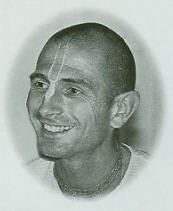
Rohininandana Dasa
AND NEVER forget Him." So states the most important instruction of the Vedas. All other rules and regulations simply serve to assist this one basic principle.
Thinking of Krsna is as natural as thinking of our own self. Despite our involvement with a multiplicity of things in this world, we always retain a sense of self. Even when we are in love and absorbed in thoughts of another, our absorption is in relationship to our self my friend or my lover.
Now that we've come to Krsna consciousness, we've learned that our self is spiritual and that we are parts of the Supreme Self, Lord Krsna. Our selfhood and our very existence are inseparable from Krsna, and we are dependent on Him, as a ray of sunshine is dependent on the sun.
Not only is Krsna the Supreme Self; He is also the supreme beloved. When the people of Vrndavana who possess nothing dearer than Krsna thought Him to be fatally enwrapped in the coils of the serpent Kaliya, they saw the whole world, including themselves, as vacant and useless.
We may now be far from the Vrndavana plane of existence, yet we can begin to sense our exclusive dependence on Krsna and our inherent love for Him. The air, the life-giving sun, the sweet taste of water, the timeless bird-song, our food, and our ability to digest it are all Krsna. As His energies, all the features of the material world are nondifferent from Him. Krsna is so kind that He takes care of us at every moment and at every step of our lives, no matter who we may be or where we may happen to roam.
In a natural, healthy state of Krsna consciousness a person never forgets Krsna. Similarly, Krsna has never forgotten and will never forget any one of us, any more than a loving parent could ever forget his child's welfare and happiness.
We can end our present sleep of forgetfulness of Krsna and ourselves by hearing and chanting about the Lord His names, qualities, and activities. This simple method is so powerful it can elevate one quickly to the spiritual platform of Krsna consciousness. We can learn, as Srila Prabhupada says, to mold our lives in such a way that we will always remember Krsna and always find ourselves awake and alive rather than asleep in the struggle for illusory survival.
The Vedic scriptures advise us to "somehow or other" remember Krsna. At first, we may think of Him as an order supplier, or we may have an improper understanding of who He is, or we may be afraid of Him or even envious of Him. But because Krsna is absolute, no matter how we think of Him we will benefit, just as, regardless of our opinion of fire, if we put our hand near it we'll feel its heat. Srila Prabhupada once said that an alcoholic could make spiritual advancement if he thought of the sweet taste of his wine as Krsna.
Of course, as we progress spiritually we'll learn to think and act more and more favorably for the development of our pure Krsna consciousness. That means we'll try to please the Lord with our every thought, word, and deed. Our remembering Krsna "somehow or other" will develop into remembering Krsna with love.
We can add Krsna to our lives in numerous and perhaps numberless ways, some of which I am trying to outline in the Bhakti-yoga at Home column. One way I haven't mentioned thus far, but which I have found of great value to me over the years, is listening to tapes. Tape players let us use Kali-yuga technology to make up for the poor memories Kali-yuga has given us. We have a chance to hear a pure devotee such as Srila Prabhupada, not once but over and over again, whenever it is convenient for us. And if we find it hard to sit down and hear, we can turn on the tape machine when we sit in our car, when we cook, or when we do repetitive things such as bathing, dressing, or hanging up the washing. If we can get in a half hour or an hour of hearing every day, our minds and intellects will be stimulated with spiritual topics throughout the day.
We can also increase our remembrance of Krsna by trying to see Him everywhere. In Bhagavad-gita Krsna gives us many hints how to do this. In fact, just remembering Lord Krsna's instructions as Arjuna did when Krsna disappeared from external vision is a way to associate with the Lord. If we find it hard to think of the original form of Krsna, we can think of His universal form. As described in the Second Canto of theSrimad-Bhagavatam, we can meditate on the universe as a huge body with mountains for bones; trees and clouds for hair, rivers for veins; oceans for an abdomen; wind for breath; the sun and moon for eyes; and passing ages for movement. Or, as the Gita describes, we may choose to contemplate the nature of matter and spirit.
Whatever our disposition, we can find a way to practice Krsna's conclusion: "A true yogi observes Me in all beings and also sees every being in Me. Indeed, the self-realized person sees Me, the Supreme Lord, everywhere." And the result? Krsna says that for such a person, "I am never lost, nor is he ever lost to Me." (Bg. 6.29-30)
Rohininandana Dasa lives in southern England with his wife and their three children. Write to him in care of BTG.
